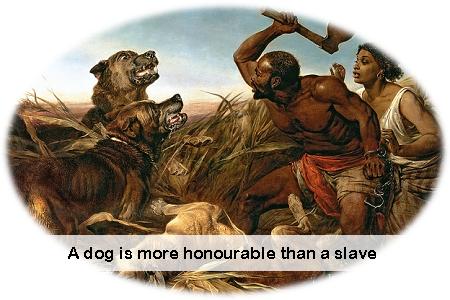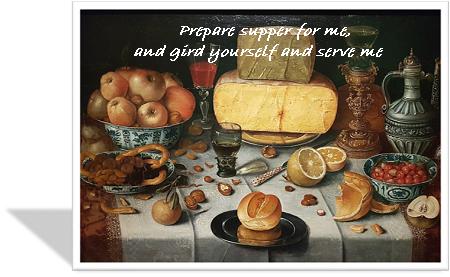Unworthy Slaves
Unworthy Slaves
Will any of you who has a servant ploughing or keeping sheep, say to him when he has come in from the field, 'Come at once and sit down at table?' Will he not rather say to him, 'Prepare supper for me, and gird yourself and serve me, till I eat and drink; and afterward you shall eat and drink'? Does he thank the servant because he did what was commanded? So you also, when you have done all that is commanded you, say, 'We are unworthy servants; we have only done what was our duty.'
Luke 17:7-10 in RSV

The basic message of this passage is clear. Nothing that we do will ever earn us God's gratitude or make Him indebted to us. This basic message also bears repeating if we want to safeguard the treasures of God's grace uncovered in the great Reformation of the sixteenth century. Two obvious questions arise when we are confronted by these verses.
-
First, what is the precise context?
-
And secondly, how specifically does this word of our Lord apply to us today?
As far as the matter of the context is concerned, it seems most attractive to see a direct relationship between this short parable and the immediately preceding words about faith. In view of the awesome demands the Lord placed before them, the disciples had cried, "Increase our faith." Christ had then told His disciples what could be accomplished by faith as a grain of mustard seed, which is very small. Now when they through faith (which is that small) can bring about tremendous and impressive things, a danger may present itself. They may become puffed up and start imagining that God can be happy that He has such good people working for Him, as if God would be indebted to them. And now, lest the disciples fall into that kind of temptation, the Lord tells this story.
The Lord makes His point in a very strong and effective way by using the form of the rhetorical question. The answers are so obvious that the disciples will find themselves signalling their approval. The RSV renders: "Will anyone of you who has a servant…" This translation is somewhat unfortunate for the original word doulos is of course not a servant but a slave. The concept of a slave is rather inimical to modern thought for to be a slave means that your autonomy and freedom has been set aside in favour of the will of another having the say over you. If you were a slave you literally no longer belonged to yourself. For this reason the concept was not very attractive to Greeks or for that matter to the Hellenized Jews of Christ's time either, in spite of the fact that the Greek translation of the Old Testament called Abraham, Moses, David and the prophets slaves of God.1 As far as the rabbis were concerned, one of the worst insults you could hurl at another man was to call him a slave. You could be excommunicated for it. A current rabbinic proverb stated that "A dog is more honourable (i.e., of greater worth before God) than a slave." Now a dog was considered the lowest of creatures.2 When therefore the disciples heard the Lord speaking about a slave they knew what was meant – one who is simply the property of his master and who exists so to speak for the master. Even what he does or produces belongs not to him but to the master.

Well, the Lord Jesus says, "Will any one of you, who has a slave ploughing or keeping sheep, say to him when he has come in from the field, 'Come in at once and sit down at table'?'' The answer is so obvious that it does not need to be given directly. Of course they would not say that to a slave. Why should they? The slave owes this kind of service to them! To say this would be to turn the relationship upside down! The Lord Jesus can therefore continue by saying "Will he not rather say (or better: 'on the contrary will he not say') to him, 'Prepare supper for me, and gird yourself and serve me, till I eat and drink; and afterward you shall eat and drink?' Does he thank the slave because he did what he was commanded?!" O, to even raise this question is to answer it. Of course not! The master is not indebted to the slave! The slave has only done what he was bought for, namely to work for his master. Did all the slave's energies and talents not belong to the master? There is therefore no question of having to thank the slave. It is inconceivable.
And then a remarkable thing happens. The Lord makes the application of this story Himself so that there is no doubt about its meaning. He starts off by saying; "So you too." Who is Jesus speaking to? Luke usually specified the audience, whether it was the crowds, disciples or apostles, the inner circle. He does so here too. Although we read of disciples in verse 1, verse 5 speaks of apostles. We must therefore understand disciples in a restricted sense. The apostles, that are the twelve, are addressed here. They are like the slaves of the parable. Indeed, how strong that realization was given to them!! In spite of the negative connotations that being a slave had, Christians prided themselves as slaves of God or of Jesus Christ. Some examples: James speaks of himself as slave of God (James 1:1) and Paul's self-characterization as slave of Jesus Christ is well-known. Although all Christians are slaves of God (1 Peter 2:16; Romans 6:22) or of Jesus Christ (1 Corinthians 7:22; Ephesians 8:6), the application of this short story is in the first place to office-bearers, the apostles; but, therefore also to ministers of the Word and those who aspire to that office. Indeed some have seen in the work which the slave in the story did allusions to the work of apostles and preachers of the gospel, – allusions given by the Lord in order to reinforce this point. Like the slave in the story the apostles and preachers of the gospel also work the field, which in their case is the people of God (1 Corinthians 3:9; 1 Corinthians 9:10). They also shepherd the sheep and serve or minister to the needs of the people.3 However that may be (whether we need to read this much into it or not), this passage clearly has something to tell us as ministers (serving a congregation or otherwise) and those aspiring to the office.
Christ says "So you too, when you have done all that is commanded you say, 'We are unworthy servants; we have only done what was our duty'." When a job is done there can be a certain amount of self-satisfaction. Indeed within the context of men, and as humans speak and think, a minister can easily be very much praised. Especially when he receives a call, then there is no better person. However, Christ teaches us here that especially as office-bearers we must look beyond the human relationships in life and look to God. How does He measure our labours? Ministers do not work for consistories and ministers set apart for teaching at the College are not in the service of the Board of Governors, regardless what the human fine print says. Ministers are slaves of Jesus Christ, as any Christian is, but with a special burden. When a certain part of the task is done, then we do not expect a thank-you from God. That is not becoming of a slave who is owned by another and whose energies and talents are the property of the great Master of us all.
Furthermore, if we know ourselves as frail human beings, then the wise minister who has finished a particular task will always say, Lord bless the good and forgive the evil! When one looks back, then one can see many shortcomings and weaknesses in the execution of one's task. Especially with the passage of time these shortcomings can become more evident in our mind. We are all part of a very frail and broken world and sin cleaves also to theologians. Does God owe us thanks!?

The Lord Jesus places the words in our mouth which we must say when a particular task is done. "We are unworthy slaves; we have only done what was our duty (i.e., lit., 'what we ought to have done')'' – The term "unworthy" requires some elucidation lest we misunderstand. It means that we have done nothing beyond what was expected of us. It does not mean that we are good for nothing; but, it shows that we are unprofitable in the sense that the Master, the Lord Jesus, did not get more out of His slaves than He had expected. It may be humbling for us all to read this, but this is reality. But it is also a comforting reality.
I chose this text for chapel meditation because as a student this is one of the texts I remember Dr. Faber referring to the most often. I suppose it was a favourite with him because it helps to maintain the true perspective and prevents us from getting carried away with our own importance. But it also is comforting. As slaves of the Lord Jesus Christ we have very little to worry about, except doing our task and office. The Lord therefore wants us to work with single-mindedness. As slaves we live in a very simple universe. The Lord is our Master and we exist for Him. What does that mean when we "retire," if I may now make a personal application to our esteemed principal. Well, it is like the slave coming in from the field. He was finished with one task, but the Master had another waiting for him. Slaves are never finished. And therefore every point of rest is a new beginning. The task is endless, for all of us, also for those who retire. We are slaves! There is no end to the service! Indeed when our task as slaves of Christ in this world is over, then either the day of our Saviour's return has come, or, we are called from this life into His glorious presence. Only then will children of God hear the words: "Well done, good and faithful slave, enter into the joy of your Master" (Matthew 25:21). But, as long as God gives life and strength, we have our work here and the Lord will show that to all of us, also to you Dr. Faber. But, although the task is endless, so is His help and aid. After all, we are under the complete care of the Master!
May that reality encourage us all. Whether we as students stand near the beginning and tremble sometimes at the awesomeness of what awaits us, or whether we stand at or beyond the day of our retirement. And let's not forget the main point. We don't have to earn our salvation by our labours. We would fail miserably. Thanks be to God that we can confess sola gratia and that not we, but He is the object of all praise and honour: soli Deo gloria!

Add new comment